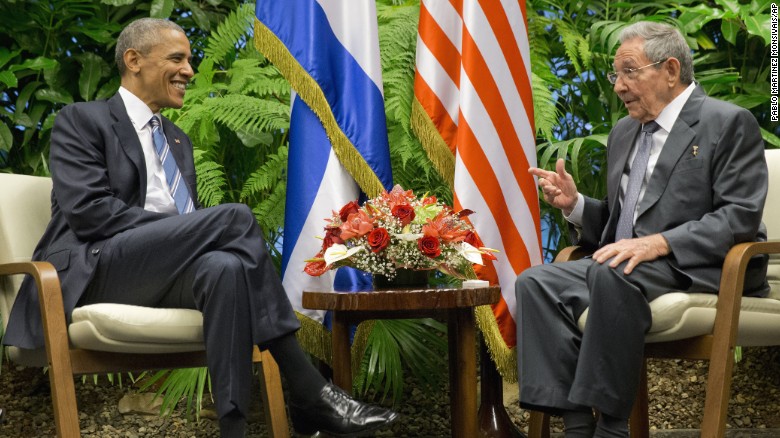At a historic joint conference, Cuban president Raul Castro and President Barack Obama agreed to work together, despite wrangling over human rights.
Mr Castro said more needed to be done to lift the US embargo on trade with Cuba and that the Guantanamo Bay detention camp must close.
Mr Obama, the first sitting president to visit Cuba since 1959, said the trade embargo would be fully lifted.
Mr Castro took questions from reporters – a rarity for him.
“Cuba’s destiny will not be decided by the United States or any other nation… The future of Cuba will be decided by Cubans not by anybody else,” Mr Obama said.
Asked about political prisoners in Cuba, Mr Castro denied it, telling journalists to “give him a list” and then they would be released “tonight”.
He also defended Cuba’s record on human rights and pointed to problems in the US.
“We defend human rights, in our view civil, political, economic, social and cultural rights are indivisible, inter-dependent and universal,” Mr Castro said.
Mr Castro is not usually subject to any aggressive questioning from reporters and called the prisoners question “not polite”, later ending the news conference by saying “I think this is enough”.
“Actually we find it inconceivable that a government does not defend and ensure the right to healthcare, education, social security, food provision and development,” he said.
Mr Obama could not say exactly when the trade embargo would be lifted, but recognised it was necessary.
“The reason is what we did for 50 years did not serve our interests or the interests of the Cuban people,” he said.
His administration has done what it can on lifting trade restrictions, he said, but further action will require Congress which is “not as productive in an election year”.
He also said further easing of the trade embargo will depend on actions Cuba takes on human rights.
Mr Obama said it is not just Cuba that the US has “deep disagreements” about human rights with – it also has disagreements with China and Vietnam.
“I believe if I engage frankly, clearly, stating our beliefs but I can’t force change on any country – it ultimately has to come from within – that is a more useful strategy,” he said. “I have faith in people”.
Reporters described the press conference as “tense” and “remarkable”.
Karla Olivares, an independent journalist from Cuba, told the BBC’s Tara McKelvey Mr Castro “talked more than usual” and the claim that Cuba does not have any political prisoners “complicated”.
Before the speech, it was announced that Google was opening an online technology centre for free Internet access at much higher speeds than what is available on the island now.
Google hopes the centre will be part of a larger effort to improve Internet access in Cuba.
BBC….
This page has been viewed 303 times


























